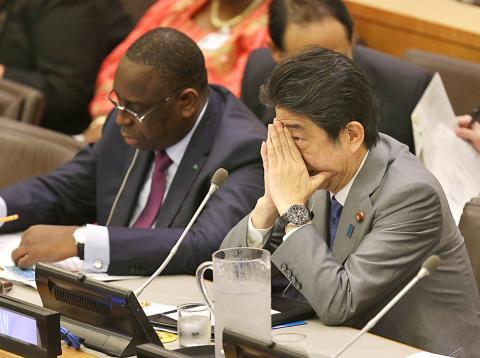Pledges to spend on education and childcare, stay tough on North Korea and revise the pacifist constitution are likely to be pillars of Japanese Prime Minister Shinzo Abe’s campaign in a snap election next month, government sources said yesterday.
Abe is considering calling the lower house poll when the legislature convenes on Sept. 28 to take advantage of his improved ratings and disarray in the opposition, ruling party and government sources have said.
Abe, whose ratings have recovered from below 30 percent in July, is betting his ruling bloc can at a minimum retain a simple majority in the chamber and at best keep the two-thirds super-majority needed to achieve his long-held goal of revising the constitution to clarify the military’s role.

Photo: AP
Abe wants to go ahead with a planned increase in the nation’s sales tax to 10 percent from 8 percent and use some of the revenue to create a “social security system for all generations,” which would invest in education while decreasing the proportion of sales tax revenue used to pay down government debt, the sources said.
Japan’s social welfare system is weighted toward spending on the elderly, with people aged 65 and above accounting for 27.7 percent of the population, according to the latest government data.
“You can promise anything you want — make a nod toward a more equitable society, empowering women, work-life balance, welfare for all generations,” said Jeffrey Kingston, director of Asian studies at Temple University Japan.
“He’s got a strategy that is going to win,” Kingston added.
However, using less tax revenue to pay down debt would make it more difficult to achieve the government’s target of returning to a primary budget surplus in fiscal 2020, which could in turn raise concerns about less rigid fiscal discipline.
“We have to maintain fiscal discipline, regardless,” Japanese Minister of Finance Taro Aso told reporters when asked about the reports.
Abe has told reporters he will make a decision on the snap election after he returns from the US on Sept. 22.
Japan’s opposition Democratic Party is struggling with single-digit support and a succession of defections. Moreover, while the nascent “Japan First” party, which boasts ties to popular Tokyo Governor Yuriko Koike, could be a viable challenger to Abe’s government, it has yet to draft a platform, pick candidates or formally register as a party.
That means Abe’s Liberal Democratic Party and its junior partner, the Komeito, have a shot at retaining their two-thirds majority in the lower house, political analysts said.
However, some analysts believe Abe’s electoral base could be undermined by voter distaste over suspected cronyism scandals and concerns about a political vacuum forming amid heightened tensions over North Korea’s nuclear and missile programs.
“I don’t dismiss the possibility of the voters giving Abe a nasty surprise,” said Gerry Curtis, professor emeritus at Columbia University in New York.

Kehinde Sanni spends his days smoothing out dents and repainting scratched bumpers in a modest autobody shop in Lagos. He has never left Nigeria, yet he speaks glowingly of Burkina Faso military leader Ibrahim Traore. “Nigeria needs someone like Ibrahim Traore of Burkina Faso. He is doing well for his country,” Sanni said. His admiration is shaped by a steady stream of viral videos, memes and social media posts — many misleading or outright false — portraying Traore as a fearless reformer who defied Western powers and reclaimed his country’s dignity. The Burkinabe strongman swept into power following a coup in September 2022

‘FRAGMENTING’: British politics have for a long time been dominated by the Labor Party and the Tories, but polls suggest that Reform now poses a significant challenge Hard-right upstarts Reform UK snatched a parliamentary seat from British Prime Minister Keir Starmer’s Labor Party yesterday in local elections that dealt a blow to the UK’s two establishment parties. Reform, led by anti-immigrant firebrand Nigel Farage, won the by-election in Runcorn and Helsby in northwest England by just six votes, as it picked up gains in other localities, including one mayoralty. The group’s strong showing continues momentum it built up at last year’s general election and appears to confirm a trend that the UK is entering an era of multi-party politics. “For the movement, for the party it’s a very, very big

ENTERTAINMENT: Rio officials have a history of organizing massive concerts on Copacabana Beach, with Madonna’s show drawing about 1.6 million fans last year Lady Gaga on Saturday night gave a free concert in front of 2 million fans who poured onto Copacabana Beach in Rio de Janeiro for the biggest show of her career. “Tonight, we’re making history... Thank you for making history with me,” Lady Gaga told a screaming crowd. The Mother Monster, as she is known, started the show at about 10:10pm local time with her 2011 song Bloody Mary. Cries of joy rose from the tightly packed fans who sang and danced shoulder-to-shoulder on the vast stretch of sand. Concert organizers said 2.1 million people attended the show. Lady Gaga

SUPPORT: The Australian prime minister promised to back Kyiv against Russia’s invasion, saying: ‘That’s my government’s position. It was yesterday. It still is’ Left-leaning Australian Prime Minister Anthony Albanese yesterday basked in his landslide election win, promising a “disciplined, orderly” government to confront cost-of-living pain and tariff turmoil. People clapped as the 62-year-old and his fiancee, Jodie Haydon, who visited his old inner Sydney haunt, Cafe Italia, surrounded by a crowd of jostling photographers and journalists. Albanese’s Labor Party is on course to win at least 83 seats in the 150-member parliament, partial results showed. Opposition leader Peter Dutton’s conservative Liberal-National coalition had just 38 seats, and other parties 12. Another 17 seats were still in doubt. “We will be a disciplined, orderly